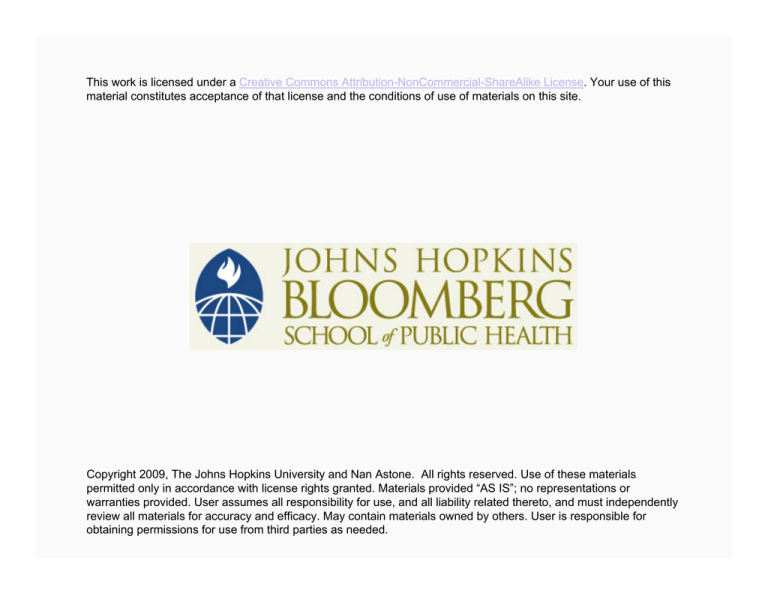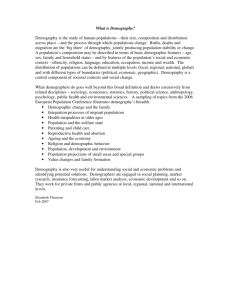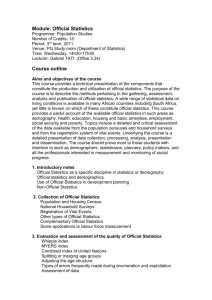
This work is licensed under a Creative Commons Attribution-NonCommercial-ShareAlike License. Your use of this
material constitutes acceptance of that license and the conditions of use of materials on this site.
Copyright 2009, The Johns Hopkins University and Nan Astone. All rights reserved. Use of these materials
permitted only in accordance with license rights granted. Materials provided “AS IS”; no representations or
warranties provided. User assumes all responsibility for use, and all liability related thereto, and must independently
review all materials for accuracy and efficacy. May contain materials owned by others. User is responsible for
obtaining permissions for use from third parties as needed.
Introduction
Nan Astone, PhD
Johns Hopkins University
Section A
Course Procedures
Learning Objectives of the Course (Subject Matter)
At the end of the course, students should be able to:
− Delineate the substantive scope of demography
− Describe the major trends in birthrates, death rates, population
growth, population sex and age structure, and population
distribution throughout history
− Identify the major explanations for changes in demographic
rates and population distribution
− Identify how demographic rates and population distribution
impinge upon the health of populations
− Identify how demographic behaviors affect and are affected by
family and kinship structure
4
Learning Objectives of the Course (Related Skills)
At the end of the course, students should be able to:
− Proficiently make graphs in Excel
− Take notes on readings using a format that will assist in both
summarizing and criticizing
5
Learning Opportunities
Ten lectures
− For two, students will prepare by doing some easy tabulations
(improving Excel graphing skills thereby)
− Readings assignments will supplement the lectures and make
them easier to understand
6
Learning Opportunities
Three class discussions
− There are three scheduled LiveTalks for which students will
prepare by reading an article and using a specific format to
summarize and criticize it
7
Learning Opportunities
One bulletin board debate
− Concern about potential negative consequences of rapid
population growth once dominated the field of demography,
and family planning was once the major nexus between
demography and public health. This is no longer the case. In
this assignment, you will debate whether or not this is positive
or negative.
One wiki group assignment
− The distribution of the population in space has huge
implications for health disparities. In this assignment you will
consider how.
8
Evaluation
Two graph assignments, each worth 15 points
Three discussion assignments, each worth 15 points
One BB discussion, worth 5 points
One wiki project, worth 20 points (5 for individual contribution, 15
for group)
9
Evaluation
All assignments are available now
Possible to complete Assignments 1 and 2 immediately
Possible to read article and write draft for Assignments 4, 6, and 7
immediately. It might be advisable to wait until you have reviewed
the relevant lectures/readings before submitting, but by all means
get started.
10
Section B
Review of Course Content
What Is Demography?
The scientific study of population
− Traditional subjects
X Components of population growth
− Mortality (death rates)
− Fertility (birthrates)
− Nuptuality
− Distribution of the population in space
z Migration
z Urban demography
12
What Is Demography?
The scientific study of population
− Newer areas of interest
X Application of demographic methods to nontraditional
subjects
− Human development
z Transition to adulthood
13
What Is Demography?
The scientific study of population
− Newer areas of interest
X Application of demographic methods to nontraditional
subjects
− Human development
z Transition to adulthood
− Social and economic issues arising from population
change
z Well-being of children (changes in marriage)
z Disability (low fertility and aging)
14
Demography and Public Health
Oldest part of demography is the study of mortality, which is also
central to public health
Concern about rapid population growth led to high levels of
collaboration between demographers and public health practitioners
in the area of family planning
15
Demography and Public Health
Rising age at marriage—particularly in the context of a declining age
at menarche—is changing the reproductive health needs of young
women all over the world
Rising age at first birth is increasing demand for infertility services
Increase in nonmarital childbearing rates and divorce rates is
increasing the number and percentage of children at high risk of
poverty
16
Demography and Public Health
Migration in any form can affect the transmission of disease; the
occupation of the Americas by Europeans resulted in the decimation
of the indigenous population
Forced migration presents a unique set of public health challenges,
including high levels of injury, malnutrition-related disease, and
sanitation-related disease
17
Demography and Public Health
Urbanization affects public health in that it can increase risk of
disease due to crowding, but it can also reduce problems of health
services delivery
Public health planning depends upon accurate demographic
forecasting
18
Demography and Public Health
Interplay between rates and the size of the population at risk
− Nonmarital teenage childbearing in the late 1960s and 1970s
X Rising age at marriage and huge cohorts of teenagers
(American baby boom) increased the size of the population
at risk SO MUCH, that even though birthrates were going
down, the number of births went up and made the
problem very visible (to this day many people think RATES
of teenage childbearing went up in the 1960s and 1970s in
the U.S.)
19
Demography and Public Health
Interplay between rates and the size of the population at risk
− Nonmarital teenage childbearing in the late 1960s and 1970s
X Rising age at marriage and huge cohorts of teenagers
(American baby boom) increased the size of the population
at risk SO MUCH, that even though birthrates were going
down, the number of births went up and made the
problem very visible (to this day many people think RATES
of teenage childbearing went up in the 1960s and 1970s in
the U.S.)
20
Demography and Public Health
Interplay between rates and the size of the population at risk
− Maternal mortality
X Ratio
− Percent of births where the mother dies
z This is what you would have as your outcome if
you did an intervention to improve obstetric care
X Rate
− Percent of women who die in childbirth
− Can reduce this by reducing birthrate (e.g., through
family planning) without changing anything about
obstetric care
21





